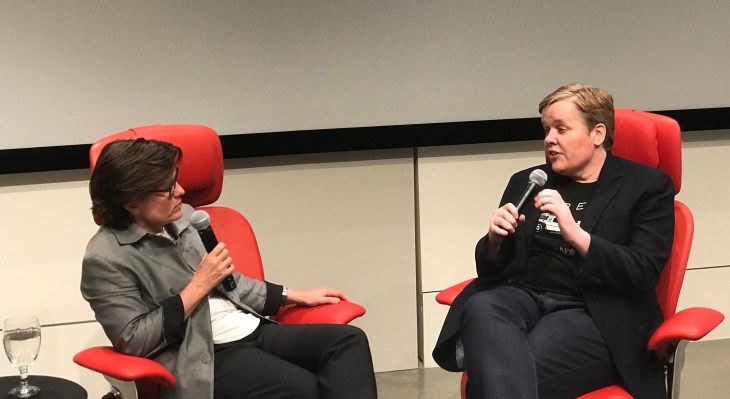Uber SVP of Leadership and Strategy Frances Frei is optimistic about the future of Uber, despite the allegations of sexual harassment, greyballing and an executive accessing a rider’s medical records. In fact, Frei wears an Uber t-shirt every day and plans to wear one every day until every single one of Uber’s 15,000 employees feels proud about wearing one, she said at a live taping of Recode Decode last night.
Frei has been Uber’s SVP of Leadership and Strategy since early June. In that short time, a lot has happened at Uber, between the company firing more than 20 people over the harassment probe to CEO Travis Kalanick resigning after receiving pressure from a handful of investors to do so. But Frei says since joining the company, she has not seen any toxicity.
“I read the newspapers and I thought there was no chance they were going to be the good guys,” Frei said about her perception prior to joining Uber. “No chance. And every single person I spoke with, I then started looking for, where is the toxicity? I found a lot of people looking for the secret memo on how to behave and if you gave them the secret memo they behaved that way. I didn’t find toxicity.”
Swisher, of course, did not let Frei off the hook, referencing things like the greyballing, geofencing Apple, tricks around regulations and the Miami letter. That’s when Frei said there’s some shame at the company.
“I’m ashamed because I’m now a part of the company,” Frei said. “I share that.”
But Frei then went on to talk about redemption, and how that’s her favorite trait in the world.
“The vast majority when there’s bad behavior, it’s good people behaving badly,” she said. “And I know that leaders can make a difference there.”
Speaking of leaders, Uber is lacking quite a few of them. Uber is without a CEO, a COO and a CFO. Regarding Uber’s hunt for a CEO, Frei said the person needs to have “reverence for the international nature of the business.” The person also needs to recognize that Uber is both a tech company and an operations company, and needs to “be able to hold both of those thoughts” in their mind.
“I don’t think you can have one be more important than another,” Frei said.
Finally, the next CEO will need to understand that Uber is “an organization of 15,000 people who have been through a lot.” This is absolutely an inflection point for Uber, Frei said, recognizing the company has gone through one crisis after the other.
“I am entirely confident we’re going to come out much stronger and much better,” Frei said. “Honestly in part because of the spotlight that’s on [Uber].”
Frei, just a couple of months into her role at Uber, sees achieving success as getting to a point where drivers love driving for the company because they want to, not because they feel like they have to, she said. Success will be when riders feel proud to use Uber and when shareholders are proud to be involved with the company, Frei said.
“It’s measuring all eight [constituencies] in a pull, not push way,” Frei said. “When all eight of those constituencies are super excited about us. I’m very sure that the business and the financials will have taken care of themselves.”
